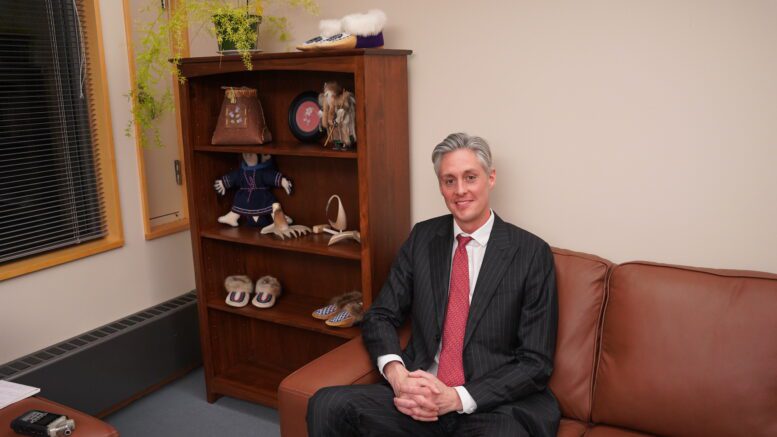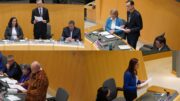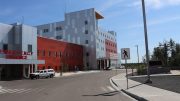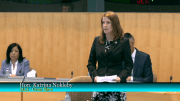R.J. Simpson, the MLA for Hay River North and former cabinet minister, was elected Premier of the Northwest Territories last week. We sat down with the new premier to discuss UNDRIP, relationships with Indigenous communities, his record as Minister of Education, Culture, and Employment, and other issues. Here’s that conversation, edited for length and clarity:
Ian Down: All right. Excellent. So I guess we’ll do some easier questions, then maybe some harder questions, then a few easier questions. So just to start off, I mean, you did it. You won. Congratulations. How does it feel?
R.J.S.: You know what, it’s all a little surreal. But I am excited. We have a good group of MLAs. And everyone is really energized, and really looking forward to getting down to work.
I.D.: Okay, excellent. And to what do you attribute your win yesterday?
R.J.S.: You know what? That’s a good question. The way I approached this is, I just put myself out there: I wasn’t campaigning, I wasn’t trying to trade votes. I just said, this is my experience, this is the way I believe we need to operate as a government: In a collaborative way, a respectful way, respectful between the cabinet and the regular members, and with the Indigenous governments. And I think that resonated with the members.
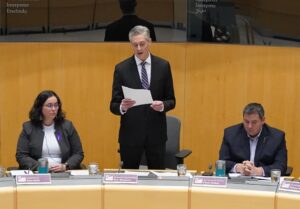
(Ian Down/CKLB photo)
I.D.: So getting into specifics, I have a couple questions that were submitted by listeners. So this person is asking about the Inuvialuit Regional Corporation who have passed laws relating to their own social services recently. And so the question is, ‘How is he going to support the Inuvialuit in achieving independence and control over their education and social services?’
R.J.S.: We are fully supportive of Indigenous governments taking over authority for their social services, for education, for anything. That is the way of the future, that’s the way the territory’s going. In 50 years, the government of the Northwest Territories won’t be the ones delivering services across the territory: It’s going to be a tapestry of self-governing nations as well as the GNWT. And so we need to move forward and support any Indigenous government in those efforts.
I.D.: Absolutely. And this person has a question related to the polytechnic. This person is concerned about the process of introducing the polytechnic stripping away community involvement in the territory’s only post-secondary institution. So this person wants to know why was there no public or Indigenous input into this decision. And what does it mean going forward for public consultation?
R.J.S.: So the transformation of Aurora College into a polytechnic university, the reason that started was so that residents of the territory could have access to a sustainable and effective post-secondary institution in the same way that that students in the South would have. So the idea is not to create a bunch of big expensive buildings, but to create an institution that is providing quality education to students. You know, we had difficulties with the college. In our some of our programs, like the teacher education program, there’s only a few students graduating every year. That should have been the crown jewel of the college. And so the process that has been undertaken has created an arm’s length governance system. And the college is now going through a quality assurance review, which is going to ensure that it is delivering quality education, and those things just weren’t in place before.
I.D.: Okay, I see.
R.J.S.: So one of the governance changes to the college is the creation of an Indigenous knowledge holders council. And the reason that was put in place is because the college needs to reflect the people that it’s serving, and primarily, the students of Aurora College are Indigenous. And so the members of that council will be able to influence all aspects of the college, right from training for staff to the student experience. And so that is one way that we’re going to ensure the public is represented in the college. In terms of the happenings in Yellowknife with Tin Can Hill, we are going through, or the college is going through, the city-lead process. And if it is determined that that is a suitable site, there will be extensive public engagement through that city-lead process.

(Ian Down/CKLB photo)
I.D.: Okay, I see. Pivoting to a different subject: Obviously, you had six cabinet members elected yesterday, too. And I noticed that only one of them has served as a cabinet minister before, and I believe three of them are new MLAs. So how do you plan on working with a relatively inexperienced cabinet?
R.J.S.: Well, we actually have more experience on this cabinet than we had on the last cabinet, because we only had one returning minister and two regular members. So I’m really confident in this group — we have a lot of different skills, we have good representation from across the territory. You know, we have members who were regular members who did a lot of work in the areas of education, of health. And so I’m really confident and I’m excited about this group. I think that whatever portfolios they’re assigned, they’re going to excel in.
I.D.: And obviously, you’re from Hay River and we’re an Indigenous radio station. So I’m curious: What’s your relationship like with the people at K’atl’odeeche First Nation?
R.J.S.: Well, you know, the K’atl’odeeche First Nation is right across the river from from Hay River; Every day, I look out my window, and I can see KFN; KFN members live in Hay River; If they live on the reserve, they travel to Hay River; People from Hay River work at KFN. So there is a divide in the community in that there’s a river between us. But you know, we’re very integrated with KFN. And in May, when there was a fire at KFN, you know, they sustained a lot of damage. And we know those people: They’re our friends, they’re our neighbors. And you know, we felt that. So it’s been a tough go for that whole region— for Hay River, for KFN. And we’re all in it together.
I.D.: Absolutely. Now, speaking of Hay River, obviously, you’re an MLA from Hay River. And unfortunately, you know, deserved or not, Hay River does have a bit of a reputation related to the drug trade and related to crime. So I’m curious, what do you hope Hay River is going to look like in four years related to those issues?
R.J.S.: Yeah, Hay River has had some real issues. And we’ve seen a number of drug poisonings causing death in Hay River. And it has been really tough on the community. And we see it on a regular basis. So there’s a real desire to address that. And so some of the things that I ran on, just as MLA, we’re addressing those. There’s things that we can do as a territorial government to better support the RCMP — legislation that we can implement, to make the NWT a less inviting place for criminals to do business. We can look at SCAN [Safer Communities and Neighbourhoods] legislation, which will allow us to close drug houses if they’re deemed a harm to the community; We can look at our housing policies to ensure that drugs aren’t being sold out of housing units.
So there’s lots of things that we can do, and that we have to do because, you know, Hay River is sort of the gateway, the entranceway into the territory, and from there, drugs move elsewhere. And so we need to stop that now. And we’re already seeing the impacts in other communities, in small communities. And so this is not just a Hay River issue: This is a territory-wide issue.
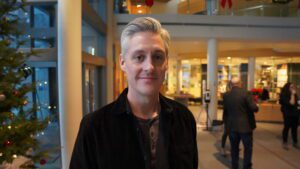
(Ian Down/CKLB photo)
I.D.: Absolutely. Okay. What do I want to ask? So you mentioned in your speech for Premier, you mentioned implementing UNDRIP [United Nations Declaration on the Rights of Indigenous Peoples]. What do you think that looks like in practice in terms of actual — in practice?
R.J.S.: Well, that’s what we need to work on. And the UNDRIP Implementation Act, specifically, requires that the action plan to achieve those goals of UNDRIP be co-developed with Indigenous governments. So what that looks like is not up to the GNWT, and it shouldn’t be up to the GNWT — it needs to be done with Indigenous governments. And so that is the work that we are going to be starting right away.
I.D.: Okay, interesting. And one of your colleagues who also was vying for Premier put forward this idea that, well, of course GNWT leaders, when they go to Ottawa, should go with Indigenous leaders when they’re making requests to the federal government. Is that something you agree with?
R.J.S.: Absolutely. And we’ve heard that from Indigenous governments. But we can’t just show up there and expect something to happen: We need to actually do the preparation. And so we really need to have the infrastructure in Ottawa on the ground so that our officials are talking to their officials. And we need to have a plan going in that we’ve developed in consultation with the Indigenous governments so that when we show up in Ottawa, they know why we’re there. We know there’s money there, and we have a plan and we bring that money home.
I.D.: Last question: What will you tackle first?
R.J.S.: Well, the first thing that we need to do is get together as a cabinet, get portfolios assigned, come together as an assembly, get our priorities set, and then we can go from there. We’re only a couple hours into this government. And so there’s a lot of work to be done. But, you know, once we get going and once the assembly gets its priorities, one of the first things that cabinet needs to do is look at our negotiating mandates for land claims and self-government agreements so that we can start making more progress in those areas.

